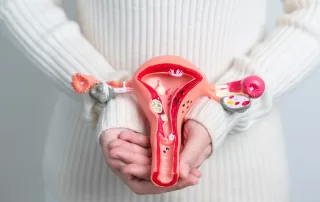Welcome to Qoctor’s online doctor service which can provide assessment for treatment to delay your period. Answer some online questions, then book a video consultation with an AHPRA-registered doctor. Repeats available (subject to assessment).
The consultation fee is $29.99. If a prescription is advised, it can be sent as an eScript to your phone OR electronically to your local pharmacy. Alternatively you can have medication delivered by an Australian partner pharmacy- in this case, the cost of medication is added at the checkout. All treatment and advice is issued subject to your doctor’s assessment.
How to stop your period
- Sometimes a menstrual period will be due at an inconvenient time- a special occasion, a holiday, a wedding or a university examination. It is possible to delay a period by a few weeks, until the timing is better.
- If you’ve ever wondered how to stop your period, there are a few ways this can be achieved- a course of oral progesterone tablets is commonly used, though the contraceptive pill or long acting contraceptives are alternative options, if started well in advance.
- For any of these options, you’ll need to speak to a doctor to discuss treatment, and make sure this is safe and suitable for you.
- Any Questions? Need a longer appointment? Book in for a general GP consult (for $49.99) HERE

Common questions & answers
When a big event like a wedding or holiday crops up, and your period is due at the same time, it can be very frustrating- it may affect how you feel physically and mentally, what activities you can take part in, and what clothes you can wear. In such situations, women quite often come to their doctor to ask how to stop a period from occurring. So, what are the options and do they work? There are actually a few, depending on the circumstances, the time-frames involved, your preferences and medical history. The three main ways are a progesterone tablet that you just take for a few weeks, the combined oral contraceptive pill, or a long acting contraceptive option. The last two options obviously need to be arranged well in advance, whilst a progesterone tablet can be started just before the expected period. Speak to a doctor to discuss your options.
In most cases your ability to become pregnant returns the moment a contraceptive medication is stopped or withdrawn. However, in the case of the long acting progesterone injection or “Depo injection”, it can take quite a few months for the effects to wear off, and the return to fertility can be delayed for a number of months.
Health Library- Women’s Health
Can you delay a period?
How to delay a period. For one reason or another, sometimes women will wish to delay a period. The monthly nuisance of menstruation is a fact of life that most women are used to. For some, periods are light and painless. For others, they are severe and debilitating, with labour-like cramps, heavy bleeding, diarrhoea and faintness. For most, it’s probably somewhere in the middle. But for all women who menstruate, it’s an inconvenience and requires a certain level of thought and planning. Of course, women just get on with things and do what must be done, as they have for millennia. Request a medical certificate But when a big event like a wedding, exam or a much-anticipated holiday crops up, and a period is due slap-bang in the middle of it, it can be particularly frustrating- it may affect how a woman [...]
UTI Symptoms and Treatment: What You Need to Know
UTI Symptoms and Treatment: What You Need to Know Urinary Tract Infections (UTIs) are common, uncomfortable, and often disruptive. But what exactly are the signs to watch for, and how can you get relief fast? In this article, we’ll break down UTI symptoms, causes, and treatment options—plus how Qoctor’s online doctors can help you get back on track, all from the comfort of home. What is a UTI? A Urinary Tract Infection (UTI) occurs when bacteria, typically Escherichia coli (E. coli), enter the urinary system, affecting the bladder, urethra, or even kidneys. Women are more prone due to a shorter urethra, but anyone can be affected. If left untreated, a UTI can escalate, making early symptom recognition critical. Common UTI Symptoms Wondering if you have a UTI? Here are the most common signs: Burning sensation when urinating – Often the first red flag. Frequent urge to pee – Even [...]
What is a hysterectomy and when is it needed?
What is a hysterectomy and when is it needed? A hysterectomy is a surgical procedure to remove a woman's uterus (womb), usually performed by a gynaecologist. It is commonly performed to treat various conditions affecting the uterus, such as fibroids, heavy or abnormal bleeding, endometriosis, chronic pelvic pain, or cancer. Once the uterus is removed, a woman will no longer have periods or be able to become pregnant. Book a GP appointment Types of hysterectomy There are different types of hysterectomy. Which one you have depends on how much of the uterus and surrounding tissue needs to be removed. Total hysterectomy: this is the most common type, where the entire uterus and cervix are removed. Partial/subtotal hysterectomy: only the upper part of the uterus is removed, leaving the cervix in place. Radical hysterectomy: typically performed [...]
Attachment styles in adult relationships
Attachment styles in adult relationships Attachment theory has been studied and widely accepted in relation to children and their caregivers, but over recent years there is much more focus on attachment in adult interpersonal relationships. In fact, the type of attachment you had as a child likely affects how you will intimately attach in later life. Book a GP appointment Four main attachment styles in adult relationships It appears that there are four main attachment styles that exist in adult relationships. These are: Anxious Avoidant Anxiously-avoidant Secure Understanding your attachment style There is no ‘right’ or ‘wrong’ in regards to what type of attachment style you display, but knowing which of the four best describes you can be a great way to work on yourself and improve your relationship. In fact, people [...]




